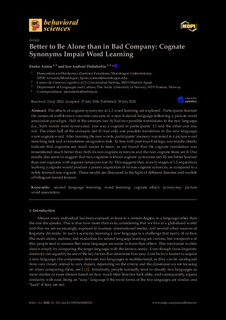Título
Better to Be Alone than in Bad Company: Cognate Synonyms Impair Word LearningAutor-a
Autor-a (de otra institución)
Fecha de publicación
2020-07-29Otras instituciones
Universidad NebrijaUiT The Arctic University of Norway
Versión
Version publicadaTipo de documento
ArtículoArtículoIdioma
InglésDerechos
© 2020 by the authors. Licensee MDPI, Basel, SwitzerlandAcceso
Acceso abiertoVersión de la editorial
https://doi.org/10.3390/bs10080123Publicado en
Behavioral Sciences Vol. 10, Núm. 8, 123Editorial
MDPIPalabras clave
Second language learning
Word learning
Cognate effect
Synonymy ... [+]
Word learning
Cognate effect
Synonymy ... [+]
Second language learning
Word learning
Cognate effect
Synonymy
Picture word association [-]
Word learning
Cognate effect
Synonymy
Picture word association [-]
Resumen
The effects of cognate synonymy in L2 word learning are explored. Participants learned
the names of well-known concrete concepts in a new fictional language following a picture-word
association para ... [+]
The effects of cognate synonymy in L2 word learning are explored. Participants learned
the names of well-known concrete concepts in a new fictional language following a picture-word
association paradigm. Half of the concepts (set A) had two possible translations in the new language
(i.e., both words were synonyms): one was a cognate in participants’ L1 and the other one was
not. The other half of the concepts (set B) had only one possible translation in the new language,
a non-cognate word. After learning the new words, participants’ memory was tested in a picture-word
matching task and a translation recognition task. In line with previous findings, our results clearly
indicate that cognates are much easier to learn, as we found that the cognate translation was
remembered much better than both its non-cognate synonym and the non-cognate from set B. Our
results also seem to suggest that non-cognates without cognate synonyms (set B) are better learned
than non-cognates with cognate synonyms (set A). This suggests that, at early stages of L2 acquisition,
learning a cognate would produce a poorer acquisition of its non-cognate synonym, as compared to a
solely learned non-cognate. These results are discussed in the light of different theories and models
of bilingual mental lexicon. [-]
Sponsorship
Gobierno de EspañaColecciones
- Artículos - Educación [139]
El ítem tiene asociados los siguientes ficheros de licencia:






















